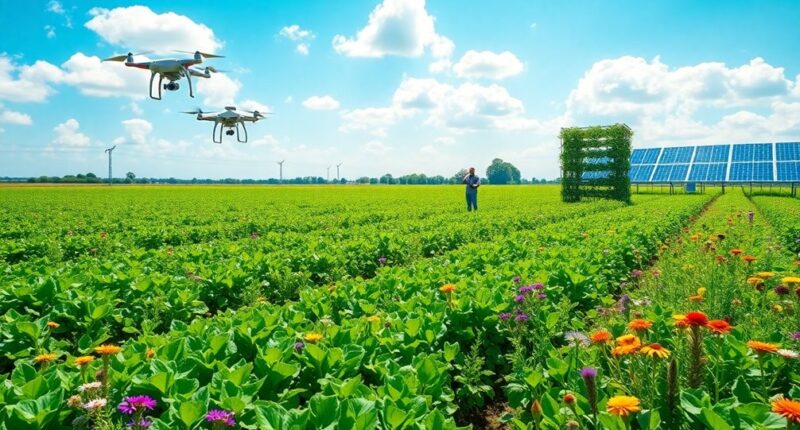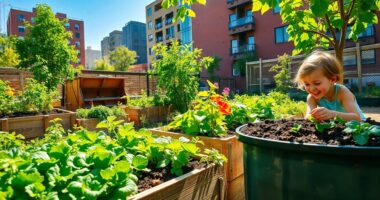Creative advancements are set to unlock European agriculture's potential by integrating precision farming with AI and IoT technologies. You can monitor soil health and weather in real-time, while innovative techniques like vertical farming conserve resources. Combining renewable energy solutions and climate-smart practices helps farmers adapt to environmental changes. These changes don't just boost productivity; they also promote sustainability. Discover how these exciting developments can transform your approach to farming and enhance your agricultural success.
Key Takeaways
- Precision farming technologies enhance crop management through satellite monitoring and real-time data, boosting efficiency and sustainability across diverse farm sizes in Europe.
- Climate-smart agriculture practices, like crop diversification and efficient water management, improve soil health and resilience against climate change impacts.
- Integrating renewable energy systems, such as solar and wind, reduces reliance on traditional power sources while decreasing the agricultural carbon footprint.
- Innovative farming techniques, including vertical farming and hydroponics, maximize yield and resource conservation, enabling more sustainable cultivation methods.
- The use of AI and robotics automates labor-intensive tasks, improves decision-making, and enhances livestock management, empowering farmers to adapt to evolving agricultural challenges.

In recent years, European agriculture has witnessed a remarkable transformation, driven by innovative practices and cutting-edge technologies. You might be amazed at how precision farming has revolutionized crop management, utilizing satellite-based monitoring and IoT sensors to give real-time insights into soil health and weather conditions.
With AI and machine learning, you can analyze data and receive tailored recommendations that enhance efficiency and sustainability, making your farming practices smarter than ever. Precision farming is becoming increasingly accessible to various farm sizes across Europe, driving productivity and resource efficiency.
Harnessing AI and machine learning empowers farmers to optimize practices, boosting efficiency and sustainability like never before.
Climate-smart agriculture is also gaining traction, focusing on adapting to climate change through conservation tillage and crop diversification. As you implement these practices, you'll notice improved soil fertility and resilience.
Efficient water management techniques like drip irrigation and rainwater harvesting further support your efforts to cultivate sustainably, ensuring you're prepared for future climate challenges.
Integrating renewable energy into agriculture is another exciting advancement. Imagine using solar-powered irrigation systems that reduce your reliance on grid electricity, or generating clean energy through wind turbines on your farmland.
You can even convert agricultural waste into biogas, providing both energy and fertilizer for your crops. These methods not only reduce your carbon footprint but also enhance your energy independence, creating a more sustainable operation.
You can further enhance productivity with innovations like vertical farming and hydroponics, which use controlled environments to maximize crop yield while conserving water and space.
By applying precision seeding and harvesting techniques, you'll minimize waste and improve operational efficiency.
The integration of AI and robotics is perhaps the most groundbreaking. With AI-driven decision support systems, you can make informed choices about your farm.
Robotic equipment automates labor-intensive tasks, while autonomous drones monitor crop health and detect early signs of disease. This technology empowers you to manage livestock better, ensuring animal health and optimizing yields.
These creative advancements are unlocking European agriculture's potential, paving the way for a more sustainable and efficient future. Embracing them can help you thrive in an ever-changing agricultural landscape.
Frequently Asked Questions
How Does Climate Change Impact European Agriculture Advancements?
Climate change significantly impacts agricultural advancements in Europe.
You'll notice that crop productivity varies regionally, with northern areas seeing improvements while southern regions face up to a 50% decline.
Extreme weather events disrupt farming, and water management becomes increasingly challenging.
To adapt, you'll need to implement climate-smart practices, diversify crops, and utilize innovative irrigation techniques.
These strategies enhance resilience, but they require support and resources to be truly effective in the face of climate stressors.
What Role Do Farmers Play in Adopting New Technologies?
You play a crucial role in adopting new technologies in agriculture. By embracing innovations like IoT sensors and drones, you can enhance efficiency and productivity on your farm.
While high costs and complexity might hold you back, your willingness to invest in advanced tools can lead to improved yields and sustainable practices.
When you leverage these technologies, you not only boost your farm's performance but also contribute to the overall advancement of the agricultural sector.
Are There Government Incentives for Innovative Farming Practices?
Oh sure, because who wouldn't want to farm like it's the 1800s?
Thankfully, there are government incentives that'll have you modernizing in no time! From Spain's Digital Kit to Germany's Agricultural Investment Program, these funds help you embrace innovative practices.
You can snag up to €250,000 for emissions reduction or €29,000 for digital solutions.
How Can Consumers Support Sustainable Agricultural Advancements?
You can support sustainable agricultural advancements in several ways.
Start by choosing organic products to promote soil health and biodiversity. Support local farmers by buying their produce, reducing environmental impacts.
Educate yourself on sustainable practices, and consider reducing meat consumption for ethical reasons. Advocate for policy changes and participate in community events focused on sustainability.
Lastly, opt for eco-friendly packaging to minimize plastic waste, contributing to a healthier environment for all.
What Future Challenges Might Hinder Agricultural Innovation in Europe?
You might face several challenges hindering agricultural innovation in Europe. Climate change creates unpredictable weather, affecting crop yields.
As you adopt new technologies, high costs and infrastructure limitations can be barriers, especially for small farmers. Labor shortages complicate farm management, while market pressures impact profitability.
Additionally, navigating complex regulations and ensuring compliance with environmental standards can pose significant operational hurdles. Addressing these issues is crucial for fostering a sustainable agricultural future.
Conclusion
As we embrace creative advancements in European agriculture, we're not just planting seeds; we're cultivating a future rich with potential. Innovations like smart technology and sustainable practices are like fresh rain on parched soil, nurturing growth and resilience. By harnessing these tools, you can help transform farming into a thriving ecosystem that benefits both the land and the people. Together, let's unlock the full potential of agriculture and ensure a bountiful harvest for generations to come.









